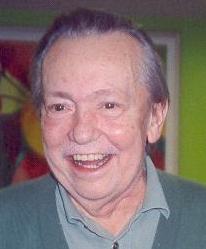Gianfrancesco Guarnieri
Gianfrancesco Guarnieri | |
|---|---|
 Gianfrancesco Guarnieri in 2004 | |
| Born | August 6, 1934 Milan, Italy |
| Died | July 22, 2006 (aged 71) São Paulo, Brazil |
| Citizenship | Italian-Brazilian |
| Spouses | Cecilia Thompson (1958–1965) Vanya Sant'Anna (1965–2006) |
Gianfrancesco Sigfrido Benedetto Marinenghi de Guarnieri (August 6, 1934 – July 22, 2006) was an Italian–Brazilian actor, lyricist, poet and playwright. He was a key participant in the Arena Theater of São Paulo, his most important work was "They Don't Wear Black Tie".[1]
Biography
[edit]He was born in Milan, 6 August 1934, to a couple of antifascist musicians.[1] His parents, the maestro Edoardo Guarnieri and the Harpist Elsa Martineghi, decided to move to Brazil in 1936, finding a new home in Rio de Janeiro. In the beginning of the 1950s, they moved again to São Paulo.
A student leader since his teenage years, Guarnieri began to do amateur theater with Oduvaldo Vianna Filho (Vianinha) and a group of students from São Paulo. In 1955 they created the "Paulista Theater of the Student" (Teatro Paulista do Estudante), with guidance from Ruggero Jacobbi. In the next year that theater joined up with The Arena Theater, founded and directed by José Renato[2]
Career
[edit]Theater
[edit]His first play was "They Don't Wear Black Tie", put on stage for the first time in 1958 in the Arena Theater[2] Directed by José Renato, the case had great talents that had begun to attract attention, like Guarnieri himself, Leila Abramo, Miriam Melhler, Flavio Migliaccio, Eugênio Kusnet, Francisco de Assis, Henrique César, Celeste Lima, Riva Nimtz, and Milton Gonçalves;
It was set to end the collective project, since they were having financial problems, but it had immense success. The play, author and cast were given awards by the governor of São Paulo State, Janio Quadros, and the arena was saved from its financial troubles. Around the same time Guarnieri also starred in "O Grande Momento" by Director Roberto Santos, the beginning of a new wave in cinema in Brazil called "Cinema Novo".[2]
The director Sandro Polloni asked for a play to be performed by Maria Della Costa, his wife and her theater company. Guarnieri left Arena for a while for this.
In 1959 came to light Gimba, his first work in italian theaters with direction by Flávio Rangel. It was a pioneer in showcasing the reality of the Rio de Janeiro hill favelas, in the form of a musical, inspired in his own life. The play would tour through Europe, being presented on the Festival of Nations, in France.
In 1961 the play A Semente (The Seed) premiered, directed also by Flávio Rangel.[2] The openly political play, out of the usual standards for the Teatro Brasileiro de Comédia (English: Brazilian Comedy Theater - TBC), showed critically communist militancy, criticizing both right-wing and left-wing methods. The play had trouble with censorship, which cooled spirits of the then "Burguois Temple of Paulista Theater", which made the play quickly leave circulation. In the same year Guarnieri also participated of two other Flávio Rangel plays: Almas Mortas (Dead Souls) of Gogol, and the first showing of A Escada (The ladder) by Jorge Andrade.
Television and Cinema
[edit]Around 1950 he began to participate also in television and cinema. He became one of Brazil's best and most popular actors.
Politics
[edit]He was Culture Secretary for the municipal government of São Paulo between 1984 and 1986, during the mayorship of Mario Covas.
He was a Communist and open about it. [3]
Filmography
[edit]| Year | Title | Role | Notes |
|---|---|---|---|
| 1958 | O Grande Momento | ||
| 1965 | The Hour and Turn of Augusto Matraga | Writer | |
| 1968 | A Muralha | Leonel Olinto | TV Series |
| 1973-1974 | Mulheres de Areia | Tonho da Lua | TV Series |
| 1977 | O Jogo da Vida | Perus | |
| 1978 | As Três Mortes de Solano | ||
| 1978 | Diário da Província | ||
| 1978 | Curumim | ||
| 1980 | Gaijin: Roads to Freedom | Enrico | |
| 1980 | Asa Branca: Um Sonho Brasileiro | Toninho | |
| 1981 | They Don't Wear Black Tie | Otávio | Writer |
| 1983 | A Próxima Vítima | Guido Andreolli | |
| 1986 | Por Incrível Que Pareça | ||
| 1989 | Que Rei Sou Eu? | King Petrus II | TV Series |
| 1980 | Beijo 2348/72 | Photographer | |
| 1990 | Rainha da Sucata | Irineu Saldanha | TV Series |
| 1991 | Mundo da Lua | Vô Orlando | TV Series |
| 1994 | O Quatrilho | Padre Giobbe | |
| 1995 | A Próxima Vítima | Eliseu Giardini | TV Series |
| 1999 | Contos de Lygia | ||
| 2002-2003 | Esperança | Pellegrini | TV Series |
| 2005-2006 | Belíssima | Peppe | TV Series, (final appearance) |
External links
[edit]- ^ a b "Gianfrancesco Guarnieri" (in Portuguese). Retrieved 22 July 2013.
- ^ a b c d Morre o ator e dramaturgo Gianfrancesco Guarnieri (July, 2006).(In Portuguese)
- ^ O mútiplo Gianfrancesco Guarnieri Estadão. (Agosto, 2014).
- 1934 births
- 2006 deaths
- Male actors from Milan
- Brazilian male film actors
- Brazilian male television actors
- Brazilian male dramatists and playwrights
- 20th-century Brazilian dramatists and playwrights
- 20th-century Brazilian male writers
- Italian emigrants to Brazil
- Italian male film actors
- Italian male television actors
- Italian male dramatists and playwrights
- 20th-century Italian dramatists and playwrights
- 20th-century Italian male writers
- Deaths from kidney failure in Brazil
- Brazilian writer stubs
- Brazilian actor stubs
